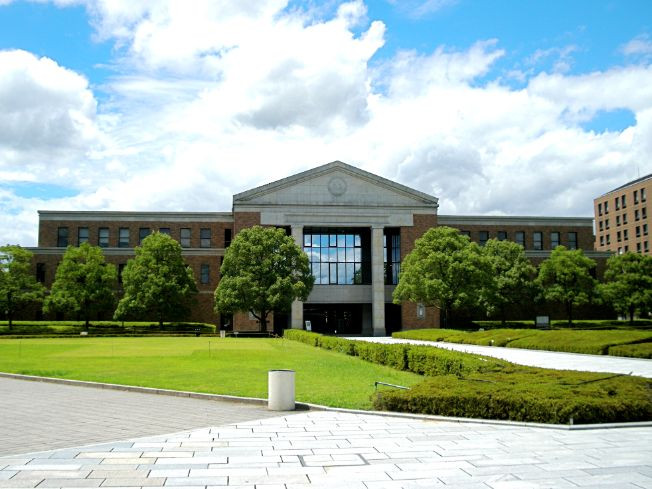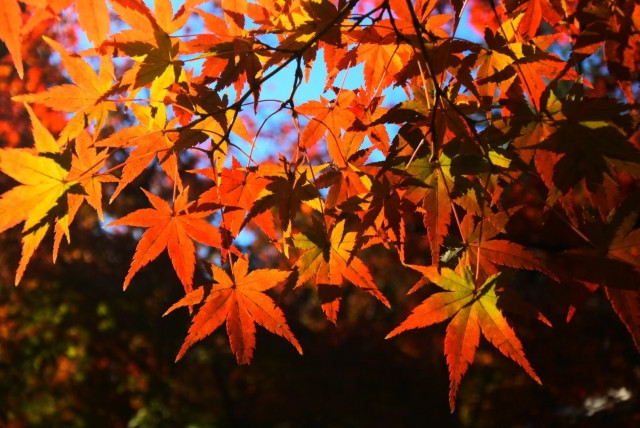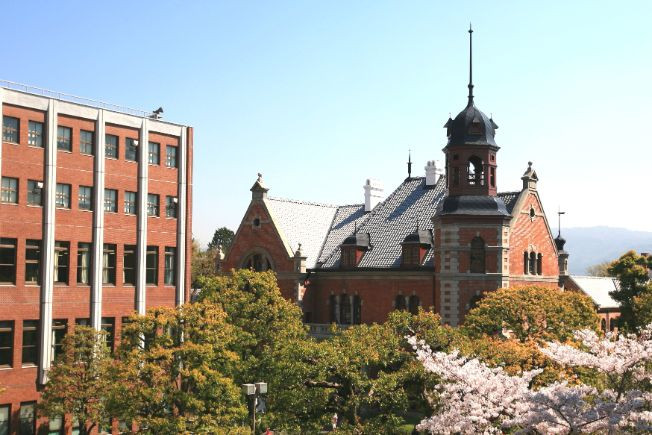Cover Photo: 663highland / CC BY-SA
Enduring for more than a century of history while maintaining a sense of exclusivity, Doshisha University is considered one of the prestigious private universities in Japan. Refining student life with its unique community, the institution promises a conducive place to flourish as an academic. Learn more about Doshisha University!
Table of Contents
Sowing the institutional seeds
History
The university's history lies in the struggles of its founder, Joseph Hardy Neesima, and how one man's conviction was realized. Neesima was deeply influenced and inspired by western philosophy at a period Japanese were not allowed to travel out of the country. However, desperate to escape oppression and his determination to learn more about Christianity, he boarded the U.S ship Berlin in July 1865. He was helped by the ship's captain, William Savory, until he safely arrived in Shanghai, China.
When Neesima arrived at Boston, Massachusetts, in July 1865, Alpheus Hardy, owner of the Wild Rover, sponsored his initial schooling at Phillips Academy. He studied philosophy, geology, and theology, among others, and became the first Japanese to graduate from a western university.
In 1874, he requested to the American Board of Commissioners for Foreign Missionaries to be allowed to open a Christian School in Japan and received 5000 USD. He immediately went back to Japan and established Doshisha Eigakko (English Academy) with the help of Kakuma Yamamoto, chair of the Kyoto prefectural assembly. He married Yamamoto's sister, Yamamoto Yaeko, in 1876, and she assisted him in the development of the school.
In 1877, the Academy became the first school to welcome female students. The Academy started with eight students, taught by Neesima himself and Jerome Davis, an American missionary. In 1890, Jo Neesima passed away, but his legacy continued to flourish. The school was awarded its university status in 1920 and is known today as Doshisha University.
※ Doshisha University,"About Doshisha - Characteristics" ※ International Dictionary of University Histories, "Doshisha University (Kyoto, Japan)", p.131 ※ Doshisha University, "Chronology"
Principles of Foundation
Joseph Neesima founded and developed Doshisha on three core principles: Christianity, Liberalism, and Internationalism. He aimed to help students achieve their full potential and produce individuals who are not merely knowledgeable but also good-natured.
Adherence to Internationalism
The University welcomes students from various countries. It provides opportunities for everyone to discover each other’s way of life, develop connections, and respect differences. Interaction with people from different races enhance knowledge and understanding of different cultures, thus improving interactions and building rapport with another individual.
Writer's Pick
Doshisha University

Academics and Integrated Educational System
At present, Doshisha provides educational opportunities from Kindergarten to Graduate studies. There are 14 faculties at the Uni, and each faculty aims to produce students who exhibit expertise in their specific fields. Listed below are English-based undergraduate and graduate degree programs:
Undergraduate Program:
The Liberal Arts Program (The Institute for the Liberal Arts) is a four-year course that offers specialization among three areas:
-
Humanities and Human Sciences (Japanese Society and Global Culture)
-
Business and Economics (Japanese Business and the Global Economy)
-
Politics and Policy Studies ( Japanese Politics and Global Studies).
Graduate Program:
The International Science and Technology Course, a collaboration between the Graduate School of Science and Engineering and the Graduate School of Life and Medical Sciences, requires two years or four semesters. Completing the course enables a student to advance in doctoral programs. This course also offers an opportunity to intern at Japanese industries in Osaka, Nara, Kyoto, and Kansai Science City to experience and better understand their ethics, management, and technology.
The Global MBA (Master's Degree Program, Global Business, and Management Studies) at Doshisha Business School trains future world business leaders who can lead with a conscience.
The Graduate School of Global Studies focuses on understanding and providing solutions to global issues. It includes American Studies, Contemporary Asian Studies, and Global Society Studies.
Educational Initiatives
Doshisha University is continually making innovations to ensure that they provide an excellent education to its students and meet global standards. Some of their accomplishments are increasing the number of international students' admission and, at the same time, supporting more students to experience student life in overseas partner schools. The continuous improvements can be seen in their research facilities in Taiwan, London, Hanoi, Beijing, Shanghai, Seoul, and Istanbul.
There are also shorter study abroad programs which can be found here:
Campus

Photo Credit: RoyHalzenski / Public domain
Doshisha University has two campuses located in Kyoto. The Imadegawa Campus at Kyoto central lies in the original site of Doshisha University. It has a lovely location because it is close to Shokoku-ji, a Buddhist temple, with a view of the Kyoto Imperial Palace. Students at the University will never get bored as they have five buildings inside the campus designated as Important Cultural Properties that can be visited. These include the Shoeikan (September 1884), the Doshisha Chapel ( June 1886), the Library (November 1887), Harris’ Scientific School (July 1890), and the Clark Memorial Hall (January 1894). Imadegawa Campus offers courses in Liberal Arts such as Social Studies, Economics, Policy Studies, Global and Regional Studies, Law, Commerce, and Theology.
The second is the Kyotanabe Campus, located at the southern part of Kyoto, which was only opened in 1986. The campus is surrounded by several historical sites too including the Kansai Science City. The Kyotanabe campus houses the faculties of Culture and Information Science, Science and Engineering, Life and Medical Sciences, Health and Sports Science, Psychology, and Global Communications.
And not to mention, Kyoto is the religious and cultural capital of Japan, with tons to do and explore during your time at Doshisha.
Career Support
The University extends its help in any way possible in helping a student to land his/her dream job. That is, after all, the end goal - to practice your profession with a clean conscience. As early as the first and second years in the University, they provide career guideline seminars to equip students with the necessary information and assess themselves if they are on the right path towards their career goal. Moreover, they developed a website accessible to students where they can search for available jobs with the necessary details already provided. Superb! To further improve chances for employment, a student can opt for internships. This is essential since many companies now prefer to hire people with experience.
International students are also given good employment opportunities, provided they meet specific requirements set by the University and the employing company.
Other Information

Student Life & Facilities
You will not feel like an outsider when you study at the university since there are a lot of other international students. Plus, the University offers assistance to foreign students, for instance, an arrangement in housing whether to stay in their dormitory at an affordable price or to give you referrals for cheap accommodations outside the campus.
The University also has its own Student Health Center that offers regular check-ups, consultations both for medical and mental health, emergency response, and other measures to ensure students' optimal health.
There are numerous facilities within the University such as a chapel, event halls, libraries, dining, sports, accommodation and recreational facilities at Doshisha. Some are made available for alumni and public use.
Student Organization Culture
There are around 170 clubs and 240 groups in different areas, and you can definitely find something that will match your interest. Some examples under Cultural clubs are the Glee club, Guitar club, Dance group, and Photography. Some sports-related clubs are basketball, archery, bowling, and tennis. Students can exercise camaraderie, compassion, humility, and creativity by joining the groups based on their interests. Also, it provides a breather from academics.
※ Doshisha University,"Extracurricular Activities (Clubs and Circles)"
Summary

Photo: honda / CC BY-SA
It is rare that you find a school that does not only focus on academics but rather guides you to achieve holistic growth. It is an institution that upholds its principles and continues to strive for excellence. Since the University is located in Kyoto, the cultural center of Japan, you will have the opportunity to study with individuals in various cultures while discovering Japan's rich traditions and customs. Doshisha receives approximately 600 job offers for its international students annually, and 98% of its graduates successfully secure jobs. There is a fair opportunity for international students to work and live in Japan!
※ Doshisha University - The Institute for the Liberal Arts, "About the ILA"































